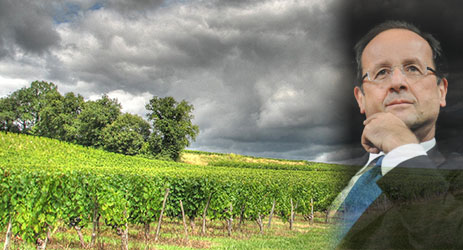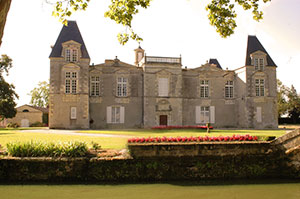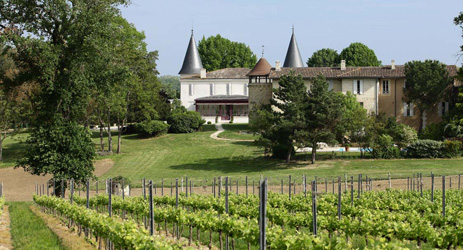Temperatures are climbing in Bordeaux, and the chateaux owners are decamping to their beachside houses in Cap Ferret, that finger of wealth on the Atlantic Coast, an hour west of the city. The same faces show up every year, and the talk, so I’m reliably informed, will be about the recent en primeur campaign (there may be a few long faces at this) and a catch-up on gossip since the summer of 2012 – weddings, marriages, births, new neighbours, fortunes moving up and down, chateaux bought and sold – and no doubt rumours of the next big ones to go.

adapted under Creative Commons BY-SA 2.0 Generic license.
‘I know of one chateau owner who is holding off signing the final sale documents with his Chinese purchasers until after his summer holiday,’ an estate agent here told me over coffee last week, ‘because he doesn’t want to deal with the beachside gossip.’
He might have been wise to sign while he has the chance. These are not easy times for the wealthy, as the new French government has them in its sight to reduce its economic deficit. The financial press has been reporting 50 new tax measures over the last three years on companies in France, with acceleration since Francois Hollande came to power in May 2012. Over €16 billion new tax revenues have been collected from companies in the last year alone. So is there a link with this, and the recent rise in big name chateaux passing out of French hands to foreign investors, most notably to the Chinese?
In many ways, the problem with taxes, and specifically succession taxes, has long been an issue for French vineyards, where properties are passed down to all children according to the Napoleonic laws, and cannot be left to just one, as in countries such as the UK. According to a recent study in Les Echos newspaper, France inheritors are the most highly taxed in Europe, with a 45% inheritance tax (droit de succession) starting at €100,000, compared to 40% starting at €375,000 in the UK.
But three specific laws brought in recently have tightened the screws even further. Firstly, an exoneration on capital gains that came in after 15 years ownership has been raised to 30 years, coupled with a raising of the wealth tax (impôt sur la fortune) that is payable on fortunes over €1.3 million, and a raising of the property transfer tax (droit de mutation) payable on all land sales from 4.8% to 5.09% - a significant rise on multi-million euro chateaux deals, although this change came in before Hollande was elected. Oh, and taxes on dividends have also risen, so shareholders in vineyard companies are taking a hit even if they don’t sell up.
The real issue is that high taxes have been increasingly linked, over the past few years, with rising land prices. Sitting on land that is shooting upwards in value sounds like a positive thing for owners, but is hugely sensitive because of the impact it has on inheritance tax, and therefore the ability for families to pass vineyards down to the next generation.

Michel Rolland recently cited succession tax issues as the reason for selling his three Pomerol estates to Hong Kong Golding Financial, adding his voice to the dozens who have recently sold for similar reasons, including Gerard Perse at Chateau Monbousquet and the Roland Cruse family at Chateau d’Issan.
Jean-Luc Coupet, of investment specialists Wine Bankers in Paris, explains. ‘Often families have held chateaux for centuries, which means that there are dozens of shareholders. They are expected to pay wealth tax for their part of a vineyard that they don’t work in, and the money that comes from dividends is small compared to the sums they can get for the sale of the land. Usually only one or two are active in the business and so emotionally invested in the estate – while the non-active members want to realise their investment.’
And sales numbers continue to march upwards. In 2012, the French land agency SAFER reported 712Bordeaux estates or vineyard parcels were sold. The figure (3,434 hectares of vines in total, or 2.72% of the vineyard area of Bordeaux) was up from 700 transactions in 2011, and 612 in 2010. Not all of these are full estates – only around 40 chateaux were sold in 2012, with the rest being what is known as the ‘wholesale market’, where plots of land exchange hands between neighbouring properties, usually to enlarge the most successful of the two estates.
‘The small plots are most typically bought local investors, and most usually French,’ says Coupet. ‘But this situation is reversed for the bigger chateaux. As the size and price of chateaux rise, increasingly only big companies, overseas institutions and very wealthy individuals can buy. They are the only ones who can afford the increasing tax burden.’
Having acted for many of them himself over recent years, Coupet has had a front row seat on the changes. ‘Chinese investors are turning towards Italian vineyards – Barolo, Chianti and others – but France remains highly attractive. And over the next few years, the trend of investing in vineyards will develop even further. There is no confidence in the banking system right now, so people are thinking about where they can invest their money, and classified vineyards offer security, prestige and legitimacy – and the well-known terroirs such as Burgundy, Champagne, Bordeaux and the northern Rhone offer exactly that. Buying a wine estate is no longer a rich man’s folly, as it once was, but an intelligent diversification of company funds.’
And something of a perfect storm is developing. As the pressure ratchets up from the French side with the new tax laws, the Chinese government has announced that it is trying to better control the outflow of capital into foreign investments. This could explain why there is such an explosion of capital going out at the moment – doing it now before controls clamp down. ‘So far, the majority of vineyards sold to China have been priced around €4 million, but I fully expect to see €50, €100 even €200 million estates within the coming year.’
It’s worth noting that there may be a slight pause in French families looking to sell over the next 12 months – the capital gains exoneration after 30 years is due to go back to 22 years, hopefully in 2014, although so far the project has been announced but not scheduled.
‘Perhaps the government has seen that it has gone too far,’ says Coupet frankly, ‘but we are in a fragile situation, and clearly for the immediate future taxes are only going one way. The consequences are of concern to everyone in the French winemaking industry, but it is small family vineyards that will be the most affected. As land prices rise, the pressure on them will rise in tandem. And overseas buyers, who want a slice of French heritage, will be ready to step in to the breach. It’s sad, but it’s the reality.’

Columnist Introduction
Jane Anson is Bordeaux correspondent for Decanter, and has lived in the region since 2003. She is author of Bordeaux Legends, a history of the First Growth wines (October 2012 Editions de la Martiniere), the Bordeaux and Southwest France author of The Wine Opus and 1000 Great Wines That Won’t Cost A Fortune (both Dorling Kindersley, 2010 and 2011). Anson is contributing writer of the Michelin Green Guide to the Wine Regions of France (March 2010, Michelin Publications), and writes a monthly wine column for the South China Morning Post in Hong Kong, where she lived from 1994 to 1997. Accredited wine teacher at the Bordeaux Ecole du Vin, with a Masters in publishing from University College London.
Click here to read all articles by Jane Anson>>
- Follow us on Weibo @Decanter醇鉴 and Facebook
and Facebook for most recent news and updates -
for most recent news and updates -
All rights reserved by Future plc. No part of this publication may be reproduced, distributed or transmitted in any form or by any means without the prior written permission of Decanter.
Only Official Media Partners (see About us) of DecanterChina.com may republish part of the content from the site without prior permission under strict Terms & Conditions. Contact china@decanter.com to learn about how to become an Official Media Partner of DecanterChina.com.


Comments
Submit